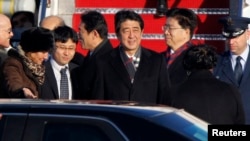Japanese Prime Minister Shinzo Abe is expected to discuss regional security and economic issues when he meets Friday with U.S. President Barack Obama in Washington.
White House officials say the first meeting between the two leaders will begin in the Oval Office, where Japan's tension with China over a territorial dispute and North Korea's latest nuclear test are expected to top the agenda.
A lunch meeting is then expected to focus on economic ties between the world's first and third biggest economies. Japan's participation in the Trans-Pacific Partnership - a U.S.-led free-trade group - is expected to be discussed.
Abe, who arrived in Washington Thursday, began his second turn as prime minister in December. He campaigned in part on a pledge of closer relations with the United States amid perceived threats from China's territorial claims.
The Japanese prime minister on Friday morning was attending a wreath-laying ceremony at Arlington National Cemetery, the final resting place for thousands of veterans.
Ahead of his visit, Abe sparked controversy in an interview with The Washington Post, where he accused China of using its state-run school system to encourage anti-Japan sentiment.
The prime minister said China has a "deeply ingrained" need for conflict with Japan and its other neighbors. He says Beijing uses the disputes to maintain strong domestic support, warning they will not be resolved soon.
China rejected the comments.
Danny Russel, the White House's top Asia advisor, said the U.S. is clearly opposed to any "coercive actions or unilateral steps that threaten the stability of the region." But he said Mr. Obama would welcome any proposals by Abe "to engage diplomatically and to manage the maritime situation in a way that prevents the risk of miscalculation."
Obama and Abe are also expected to address challenges posed by North Korea to the U.S. and its allies. During a telephone call last week, the two leaders pledged "significant" actions at the United Nations in response to Pyongyang's February 12 nuclear test.
Deputy National Security Advisor for Strategic Communications Ben Rhodes says the North Korean nuclear threat highlights the importance of strong U.S.-Japan defense ties and the need to maintain a "robust defense posture in Northeast Asia."
White House officials say the first meeting between the two leaders will begin in the Oval Office, where Japan's tension with China over a territorial dispute and North Korea's latest nuclear test are expected to top the agenda.
A lunch meeting is then expected to focus on economic ties between the world's first and third biggest economies. Japan's participation in the Trans-Pacific Partnership - a U.S.-led free-trade group - is expected to be discussed.
Abe, who arrived in Washington Thursday, began his second turn as prime minister in December. He campaigned in part on a pledge of closer relations with the United States amid perceived threats from China's territorial claims.
The Japanese prime minister on Friday morning was attending a wreath-laying ceremony at Arlington National Cemetery, the final resting place for thousands of veterans.
Ahead of his visit, Abe sparked controversy in an interview with The Washington Post, where he accused China of using its state-run school system to encourage anti-Japan sentiment.
The prime minister said China has a "deeply ingrained" need for conflict with Japan and its other neighbors. He says Beijing uses the disputes to maintain strong domestic support, warning they will not be resolved soon.
China rejected the comments.
Danny Russel, the White House's top Asia advisor, said the U.S. is clearly opposed to any "coercive actions or unilateral steps that threaten the stability of the region." But he said Mr. Obama would welcome any proposals by Abe "to engage diplomatically and to manage the maritime situation in a way that prevents the risk of miscalculation."
Obama and Abe are also expected to address challenges posed by North Korea to the U.S. and its allies. During a telephone call last week, the two leaders pledged "significant" actions at the United Nations in response to Pyongyang's February 12 nuclear test.
Deputy National Security Advisor for Strategic Communications Ben Rhodes says the North Korean nuclear threat highlights the importance of strong U.S.-Japan defense ties and the need to maintain a "robust defense posture in Northeast Asia."




